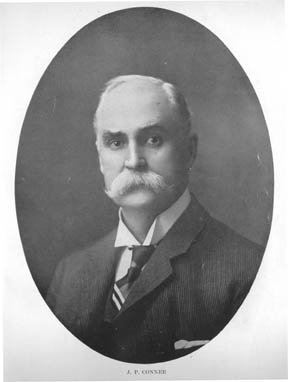Judge James Perry Conner
Carlisle has said that "biography is the most interesting as well as the most profitable reading," and there is in the life record of one to whom success has come as the reward of earnest and honorable effort something that arouses the ambition and stimulates the labors of others. There is much in the history of Judge James Perry Conner that can be set down with profit, for throughout his life he has held to high standards of manhood and citizenship and in public service has maintained a stainless record, exciting little of the envy and unfair criticism which are so often heaped upon an official by those who hold differing political opinions. Men of all parties speak of him in terms of confidence and high respect.
He was born in Morristown (now Parker), Randolph county, Indiana, January 27, 1851, his parents being Dr. William L. and Maria A. (Stiffler) Conner, the former a native of North Carolina and the latter of Pennsylvania. Dr. Conner, after his graduation from a medical college, located for practice in Morristown, Indiana, where he remained an active and valued member of the profession until his death, which occurred in 1854, when he was but thirtythree years of age. His wife survived him and married again, her second husband being Carey Bradfield. In 1856 they removed to Iowa, settling in Spring Creek township, Black Hawk county, where Mrs. Bradfield passed away at the age of fifty-seven years. Her husband reached the age of sixty-five. They were the parents of three children, of whom but one is now living; Ellsworth Bradfield, of Minnesota.
The Conner family to which the father belonged was noted for its many sons, all stalwart men, over six feet in height. Unto Dr. and Mrs. Conner there were born four children: Martha, the wife of W. R. Bradfield, of La Porte City, Black Hawk county, Iowa; Calvin, who died at the age of twenty-six years, after having been admitted to the bar; James P.; and one who died in infancy.
James Perry Conner was reared upon the old home farm and acquired his early education in the district schools. At the age of sixteen he went away to school, attending the Upper Iowa University. He had come to this state in 1856, with his mother, and has, therefore, been almost a lifelong resident of Iowa. After attending the Upper Iowa University he returned home and engagd in teaching in the school in which his early education had been acquired. Later he turned his attention to the study of law, which he pursued in the State University at Iowa City, and following his graduation in June, 1873, he was admitted to the bar and on the 15th of November, 1873, settled at Denison for the practice of his profession.
He was not long in demonstrating his power as an advocate before the courts and also gave proof of his ability and judgment as a counselor. In 1880 he was elected district attorney of the thirteenth judicial district, which position he acceptably filled for four years. In 1884 he was elected judge of the circuit court of the thirteenth judicial district of Iowa and in 1886 was elected district judge of the sixteenth judicial district, having the support of both the republican and democratic parties, a fact indicative of the impartial service which he had rendered when previously upon the bench.
He has long been recognized as a leading member of the republican party in Crawford county and in 1892 was a delegate to the republican national convention at Minneapolis. On the 26th of September, 1900, he was nominated by the republican convention of the tenth Iowa district as its candidate for the fifty-sixth congress to fill the vacancy caused by the resignation of the Hon. John J. P. Dolliver, recently deceased. Judge Conner was elected to the office and by reelection served also in the fifty-seventh, fifty-eighth, fifty-ninth and sixtieth congresses. At his last election he received twenty-six thousand and seventeen votes against fifteen thousand, three hundred and seventeen cast for J. B. Butler, the democratic candidate; six hundred and twenty-nine for N. S. Sheffield, the socialist candidate; and seven hundred and sixty-one for William Beckett, the prohibition candidate. His work in congress has shown that he has a statesman's grasp of affairs, that he has given careful consideration to questions coming up for settlement and that he stands firmly in support of what he believes to be right. The integrity of his position is never questioned, and even those opposed to him politically entertain for him high respect because of his loyalty to his honest convictions.
On the 12th of October, 1875, Judge Conner was married to Miss Allie M. Cowdrey. They have a son, Raymond, who is manager of the Review Publishing Company, in which Judge Conner is a heavy stockholder.
He belongs to the Methodist church and gives his aid and cooperation to all the agencies and movements which tend to uplift humanity, to broaden the vision of life and to promote material, intellectual, political, social and moral progress. While he hac; held to high ideals, he has labored with practical purpose. Few men of Crawford county have remained longer in public service. and the record of none has been more faultless in honor, fearless in conduct or stainless in reputation.
Source: History of Crawford County, Iowa. Vol. II. Chicago: The S. J. Clarke Publishing Co., 1911.



